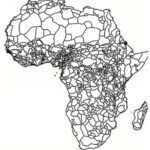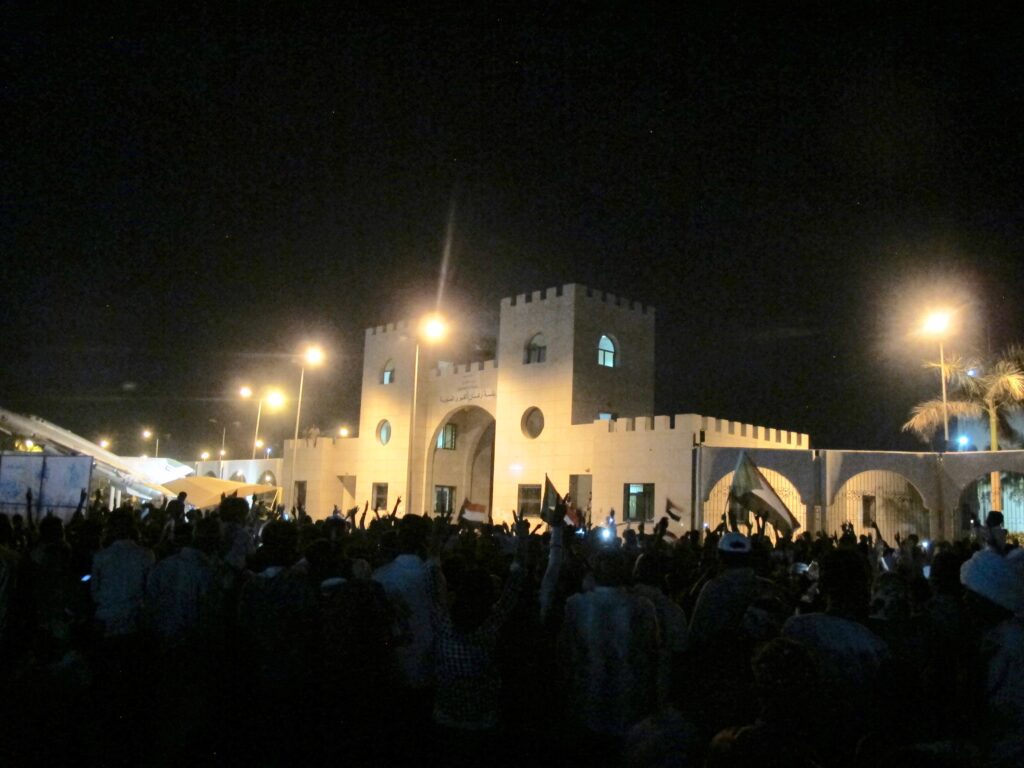Looking worried Abelmonim stands with his two young daughters among the hundreds of thousands of demonstrators in front of the military complex in the Sudanese capital Khartoum. “My daughters forced me to come here,” he says. “They want to experience the revolution.” The girls, in traditional pink robes only showing part of their faces, giggle amusingly. The power struggle between the civilians and the soldiers who overthrew dictator Bashir earlier April is continuing. And with that also this sit-in. “Dad, can we come again tomorrow,” the daughters ask.
Further up in the crowd, anger strikes among a group of women in tight pants. They want an immediate transfer of the military’s power to the civilians. They clench their fists, turn to the Department of Defense and chant, “We won’t let the army steal the revolution.” They turn their anger against military ruler Abdel-Fattah Burhan. Until recently, the demonstrators thought that he would swiftly transfer power to the citizens, but that has not happened yet. The military council summoned protesters, who have been participating in this sit-in since the beginning of April, to clear the field and clear the roads ‘immediately’.
Sudanese are drunk on freedom. All races, all tribes, all movements within Islam are jubilant after the end of thirty years of dictatorship. A man waves gallows with the text “Who knows where Bashir is?”
During the rule of the now displaced President Omar al-Bashir, the Arab element in Sudanese culture was emphasized almost exclusively, to the detriment of the African dimension. “The beauty of this revolution is that we are equal again,” a man exults, “here all Sudanese embrace each other!”
Everyone has the headphones of his cell phone hanging around his neck, everyone makes selfies. This is the youth revolution, a revolt made possible by social media. At the numerous roadblocks around the sit-in, young people search people for weapons, street children are recruited to clean up the plastic waste, young chefs come to cook food in huge pans donated by businessmen for the thousands of demonstrators who sleep every night. “I always thought that the young people only listen to music on their cell phones, but now it shows how they are politicized,” says an older man. He is a nomad from Eastern Sudan and left his camels on the outskirts of the city to come and demonstrate.
Bashir’s reign was not just a political and corrupt dictatorship. The ruling group of right-wing radical Muslims transformed society into a kind of theocracy that forced itself into everything. The interaction between men and women, clothing, culture, everything had to be moulded according to the laws of their faith. “We must reverse Islamization,” says Ismail Osman, a student at the University of Khartoum. “History, biology, everything became a fraud. Intellectual education has disappeared, instead we were taught how to dress and how to eat. Sudanese have become a lot more stupid under Bashir.”
On the long avenue in front of the military headquarters, everyone puts forward their own demands, in the form of slogans scribbled on cardboard. Thirty years of dictatorship exerted its influence in all areas and in all corners. Young people in the diaspora helped digitally to organize the protest and demand women’s rights. But their demands are not the same as those of women wearing headscarves, who are lying on the pavement under a plastic sheet with their children. “The biggest problem during Bashir was that the men were too poor to marry us,” says the young woman Hiba. “Of course, women must be granted more rights, but that must be done within the limits of our Sudanese culture, we must not make excessive demands.”
Further down the avenue is a long portrait gallery of enlarged passport photos of fallen demonstrators. From an unfinished building opposite the Ministry of Defense, snipers of the secret service opened fire on the demonstrators beginning of April, after which soldiers of the regular armed forces opened their doors to the protesters for protection. That was the start of the military coup.
Portraits of young people
Dozens of civilians died in the shooting. Almost all portraits are of young people. “They killed my friends,” says the student Abdi. “Some were taken to the hospital, but there too they were shot at with tear gas. Do you now understand my banner?” The Bashir regime must be completely dismantled, and the perpetrators punished, Abdi wrote on his banner.
This article was first published in NRC Handelsblad on 23-4-2019
All pictures by Johannes Dieterich

